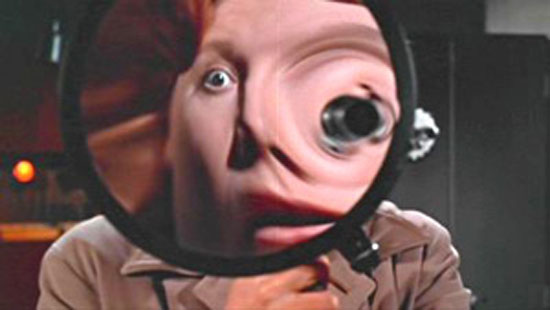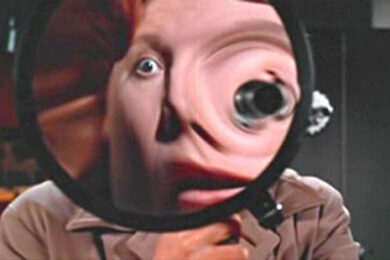Big bugs, giant women and shrinking men left us crawling out of the atomic age into the 1960s, forcing horror films to bring new ideas to the screen. This new challenge helped carve out a more serious place for horror film makers. They looked back two or three decades to draw upon elements that the bigger Universal Monster movies had forgotten in the intervening years. In England, Hammer was securing its place in the hallowed halls of terror with a steady revamping of those very same monsters; twisting and turning the tales to ever darker more foreboding realms of crimson shock terror.
The true terror, however, was to be found drawing away from the more obvious jumps and scares, instead relying on the human taking centre screen. The unsettling nature of what appeared on screen had mostly been forgotten for the easier games of blood, deformity and other-worldly terrors. Yet 1960 turned the camera’s gaze inwards at ourselves, and combined with technological advances and clearer understanding of the depths of human depravity (and a censor more willing to allow us to see this stuff), we were delivered a bumper year for horror fans.
The changes forged in 1960 would influence the genre for years to come… ultimately leaving people with some very uncomfortable viewing.
Job done.
At the forefront of this onslaught (in the English speaking world at least) was none other than Michael Powell’s Peeping Tom.
Better known for his much more palatable endeavours in partnership with Emeric Pressburger, they flew high through the wartime years with one success after another. Through the Fifties, their partnership declined and dissolved. until ultimately it was no more, but no less renowned. When Powell came out on his own with a new film, expectations were high. So high in fact that the fall was bound to be painful and substantial.
The critics were not prepared for their cherished art to be questioned so closely, for a villain, so vile, nasty and perverted a man to be shown sympathy in a way that short of M, had not been done before.
So much of Peeping Tom is about shocking, upsetting and challenging the viewer. The opening shot eerily lays out the next 100 minutes. This film is simply about voyeurism, as that eye gazes out at us, watching us, watching it, maintaining that shot until exactly the point at which it becomes uncomfortable, we start to wonder who’s watching who. As the film progresses, the weapon of choice is pulled out from behind a mac, peering out is a camera, indiscriminate in its viewing, yet directed by the unseen handler, it creeps down a luridly lit back street in London, fixing a gaze – our gaze – as we slip into the world of cinéma vérité, on the "two bob whore" waiting by a doorway. We are no longer watching this passively, we are intrinsically linked to what unfolds on the screen. We become entangled and implicated a murder we are helpless to prevent.
All bets are off in the first five minutes.
As the story progresses we find levels of discomfort amped up time and time again, rooting for the man who forced us to kill, hoping love will save him, feeling for him because of the cards life has dealt poor Mark Lewis, played masterfully and unnervingly by German born, Karl Boehm.
This is new ground, this isn’t some disgusting green monster with fangs wronged by science or driven by the supernatural nor is it a crazed madman rampaging through darkened Victorian back alleys slaying prostitutes.
Lewis is an attractive man, with a respectable job and ambitions. He’s intelligent, passionate and driven. He is like many of us. Shy and unsure around the opposite sex, he has many of the weaknesses we have.
In an era rife with sexual repression, Powell thrusts what many wish to ignore upon us, scratching away the grime to show us we are never that far from the seedy edge of society we choose to ignore. A moonlighting photographer snaps pics of less than interested women who need a few extra dollars, so they can sell collections of nudie pics under the counter. Nervous well to do older men "who won’t be doing the crossword puzzle tonight", are the customers. Again we are implicated in something we would rather not be involved in.
In the cold light of day, it should come as no surprise that the critics sharpened their knives and in a blind frenzy slashed away at Powell’s unrecognised masterpiece. Decrying it as filth, sickening, unhealthy and infamously likened to sewage with an everlasting stench.
Released months before Psycho, often cited as the birth of modern horror, Peeping Tom perhaps didn’t have the charismatic force of Hitchcock’s film which might have saved it from the critics’ blows. Psycho would for years be cherished and dissected, it would be an influence on some films and paid homage to in others. Sadly Peeping Tom was relegated to the very same back streets it so vividly captured and for years was a spoken of in hushed tones and passed around surreptitiously from one excited cinephile to another.
So ironically, like Mark Lewis, Michael Powell became the victim of his camera and his career was destroyed. Fortunately, unlike many before him, most notably Tod Browning, he lived to see "the stench" of his film sweeten and gain respect and be appreciated for the game changer it was.
The striking colours and excessive uses of reds and green would undoubtedly go on to influence giallo masters Dario Argento and Mario Bava, whose own classic, if more traditional folkloric tale, Black Sunday was also released in 1960. Because this was the year an entire sub genre, the psychological thriller or psychological horror had just been schooled on how to really get under the skin and send people home quivering, nervously wondering what their neighbours were really up to.
And now after 50-years of working it’s way back to its rightful place, standing strong and proud next to Hitchcock’s Psycho, backed by such notables as Martin Scorsese, this dirty little film has been given a second chance, a new life in an era where it can be appreciated. Its power has not weakened with time as it lingers in your head like a pervert peering through your window, uncomforably and invasive.
A theatrical release and an eye-melting Blu-ray release from Optimum Home Entertainment, gorgeously remastered, make this experiment in fear even more frightening and riviting.
<a href="http://www.cigaretteburnscinema.com/" target=”out">Josh Saco runs the incomparably weird Cigarette Burns Cinema night in London..



